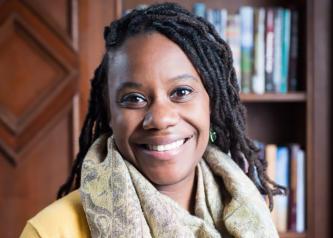

Assistant Professor, Department of Music
Jessica Swanston Baker is an ethnomusicologist who specializes in Caribbean popular music. Her current project, Island Time: Speed and the Archipelago from St. Kitts and Nevis traces the sonic history, ethnographic present, and speculative trajectory of wilders, a style of popular music from St. Kitts and Nevis that gained popularity in the late 1990s. This book presents speed and the archipelago as central organizing concepts out of which a broad range of West Indian performance practices have emerged, and participates in a project of imagining how the archipelago offers horizontal alternatives for measuring, discussing, diagraming, and plotting our contemporary world. One of Professor Baker’s more nascent research projects is the ethnography of music and neurodivergence. This project interrogates the social, cognitive, and sonic entanglements between black womanhood, neurodivergence, and sound by examining the contemporary usages of music and sound to alleviate and mediate manifestations of forms of neurodivergence articulated as Attention Deficit Hyperactivity Disorder (ADHD, sometimes referred to as Kinetic Cognitive Style or Variable Attention Stimulus Trait). When she is not teaching, researching, or singing with her kids, Professor Baker spends her time jumping rope with Woodlawn Double Dutch, the community Double Dutch club she co-founded in 2020.
Q: Why is international collaboration important in your field of study?
A: As someone who researches and participates in the intellectual tradition of the Caribbean, it’s important to me that my work is useful and relevant to people of the Caribbean diaspora. Ethnomusicology is a field that has always benefitted from international collaboration as a means of continually redefining the core of our discipline. How we study music and what we even consider music are most effectively addressed through international (and other kinds of cross-coalitional) collaboration.
Q: How has your work with international partners been beneficial to you and your career?
A: The most beneficial part of working with international collaborators has been broadening my network of intellectual partners and resources.